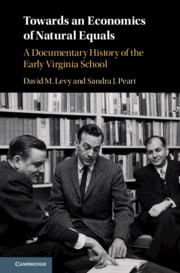Book contents
- Towards an Economics of Natural Equals
- Frontispiece
- Towards an Economics of Natural Equals
- Copyright page
- Dedication
- Contents
- Figures
- Tables
- Preface
- Acknowledgments
- 1 Why the Virginia School of Political Economy Matters
- 2 James Buchanan and the Return to an Economics of Natural Equals
- 3 “Almost Wholly Negative”: An Early Reaction to the Virginia School
- 4 “The Economics of Universal Education” and After: From Friedman to Rawls
- 5 Virginia Political Economy and Public Choice Economics
- 6 The Individuals and Their Connections
- 7 The Role of the Earhart Foundation in the Early Virginia School
- 8 The Virginia School and the Anti-democratic Right
- 9 Neoliberalism, the Virginia School, and the Geldard Report
- 10 Conclusion: Should the Virginia School be Restored?
- Select Bibliography
- Index
9 - Neoliberalism, the Virginia School, and the Geldard Report
Published online by Cambridge University Press: 16 December 2019
- Towards an Economics of Natural Equals
- Frontispiece
- Towards an Economics of Natural Equals
- Copyright page
- Dedication
- Contents
- Figures
- Tables
- Preface
- Acknowledgments
- 1 Why the Virginia School of Political Economy Matters
- 2 James Buchanan and the Return to an Economics of Natural Equals
- 3 “Almost Wholly Negative”: An Early Reaction to the Virginia School
- 4 “The Economics of Universal Education” and After: From Friedman to Rawls
- 5 Virginia Political Economy and Public Choice Economics
- 6 The Individuals and Their Connections
- 7 The Role of the Earhart Foundation in the Early Virginia School
- 8 The Virginia School and the Anti-democratic Right
- 9 Neoliberalism, the Virginia School, and the Geldard Report
- 10 Conclusion: Should the Virginia School be Restored?
- Select Bibliography
- Index
Summary
The 1963 Geldard Report on the University of Virginia faculty described the early Virginia School economists as “neo-liberal” and asserted they failed to provide graduate students a modern education. Only an extract describing the economics department was known before so the evaluation could not be put into context. Had the authors of the report known modern economics, they would have remarked on Allais lectures at the TJC in 1957. Neo-liberal was then an unusual word. As it has come to be used, neo-liberalism supposes an idealization of efficiency and market activity. This differs from an earlier liberalism, which emphasized exchange and viewed democracy as government by discussion. Coase’s advice to the Fabian Society committee for broadcasting reform was to remove the BBC’s monopoly position by breaking it into competing services provided by the government, to allow taxpayers a wider choice of television and radio programs, with more points of view. Buchanan’s club theory is remarkable in this context because the distinction between market activity and public activity is fuzzy. The neo-liberal charge ignores the importance of the compensation brought about by logrolling.
- Type
- Chapter
- Information
- Towards an Economics of Natural EqualsA Documentary History of the Early Virginia School, pp. 237 - 257Publisher: Cambridge University PressPrint publication year: 2020

